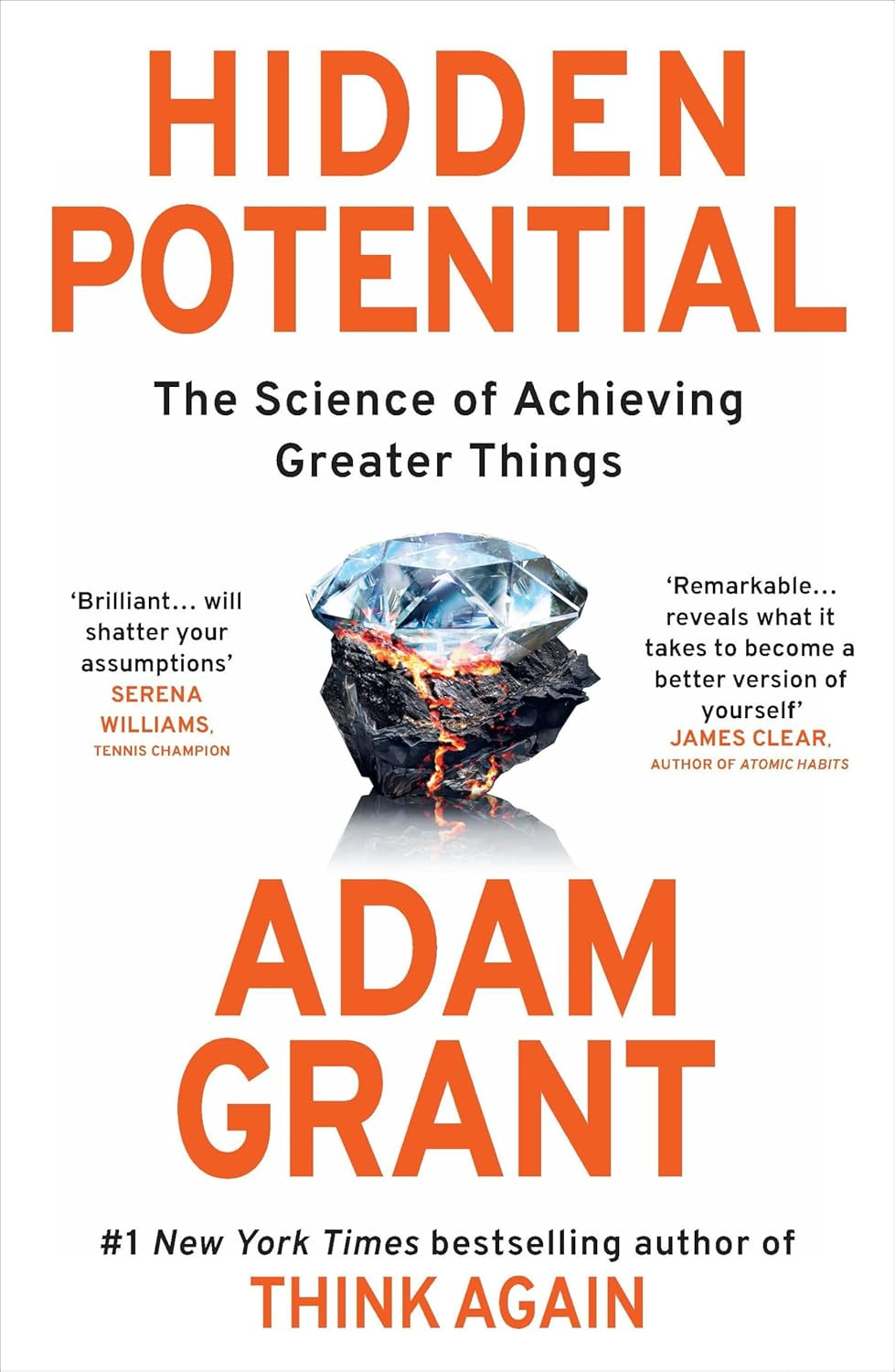We live in a world that’s obsessed with talent. We celebrate gifted students in school, natural athletes in sports, and child prodigies in music. But admiring people who start out with innate advantages leads us to overlook the distances we ourselves can travel.
We can all improve at improving. And when opportunity doesn’t knock, there are ways to build a door.
Hidden Potential offers a new framework for raising aspirations and exceeding expectations. Adam Grant weaves together groundbreaking evidence, surprising insights, and vivid storytelling that takes us from the classroom to the boardroom, the playground to the Olympics, and underground to outer space. He shows that progress depends less on how hard you work than how well you learn.
Growth is not about the genius you possess – it’s about the character you develop. Grant explores how to build the character skills and motivational structures to realize our own potential, and how to design systems that create opportunities for those who have been underrated and overlooked.
Introducing AtomicIdeas V2.0: We bring you conversaional audiobooks that brings you the big ideas from world’s best non-fiction books.
A human+AI collab project
Atomic Ideas from the book
Don't Shy Away from Discomfort
Adam Grant encourage us to reframe our relationship with discomfort. Instead of avoiding it, we should view discomfort as a signal of growth. Much like physical muscles require resistance to grow stronger, our character is built through challenges and even setbacks.
Challenge Your Learning Habits: While everyone has preferred learning styles, sticking to what's comfortable can limit growth. Pushing yourself to learn in new ways – even if they feel awkward initially – can lead to more profound understanding. For example, if you usually learn best by reading, try explaining a concept out loud as if you're teaching someone else.
Don't Wait to Feel "Ready": Applying knowledge as you acquire it, even if you don't feel fully confident, accelerates learning. This active approach helps you retain information better and identify areas for improvement more effectively.
Embrace the "Mistake Budget": Everyone makes mistakes. Instead of fearing them, normalize them. By expecting and accepting mistakes as part of the process, you reduce the urge to overthink and free yourself to experiment. This experimentation often leads to unexpected breakthroughs.
Infuse Learning with Deliberate Play
Deliberate play combines structured practice with the freedom and fun of experimentation. This approach is especially effective for developing skills that require creativity, adaptability, and a willingness to explore unconventional solutions.
Structure Meets Enjoyment: The sources suggest that infusing learning with elements of play can help us break down complex tasks into smaller, more manageable components. By focusing on specific skills in a playful and engaging manner, we can practice them more effectively and avoid burnout.
Serious Play Across Domains: Deliberate play has applications beyond traditional educational settings. The sources cite examples of how it can benefit medical professionals, salespeople, athletes, and individuals in many other fields. For example, medical students who practiced communication skills through improv exercises showed marked improvement in patient care, demonstrating that playfulness can be a powerful tool for professional development.
Engagement as Fuel for Growth: By finding ways to make learning enjoyable, deliberate play helps sustain motivation over time. When we are engaged and having fun, we are more likely to stick with challenging tasks and persevere through obstacles.
Cultivate a Supportive Ecosystem for Growth
Adam Grant underscore the importance of seeking and providing support throughout the learning journey. We grow not in isolation, but within a network of relationships that provide guidance, encouragement, and diverse perspectives.
Wisdom from Multiple Mentors: Instead of seeking a single, all-knowing mentor, cultivate relationships with multiple mentors who can offer different perspectives and experiences. This diverse guidance can help you uncover various paths and make more informed decisions about which direction to take. The sources highlight R.A. Dickey's experience as an example. To master the rare knuckleball pitch, he had to learn from multiple coaches and former players, as no single expert possessed all the answers.
The Empowering Act of Teaching: Coaching or mentoring others can strengthen our own understanding and confidence. When we explain concepts to others, we not only reinforce our own knowledge but also realize that we possess valuable insights to share. This realization can be incredibly empowering, particularly for individuals from marginalized groups who may have internalized doubts about their capabilities.
Shared Experiences as Motivation: Learning from individuals who have overcome similar challenges can be incredibly motivating. When we see others who have faced and overcome adversity, it reinforces our belief that we can do the same. This is especially powerful for those who may feel alone in their struggles.
A Foundation of Psychological Safety: Creating an environment where individuals feel safe asking questions, making mistakes, and expressing their ideas without fear of judgment is essential for fostering growth. This sense of psychological safety encourages risk-taking, experimentation, and a willingness to learn from setbacks, all of which are crucial ingredients for reaching our full potential.
Adam Grant reminds us that reaching our full potential is not about being perfect, but about cultivating character, finding joy in the process, and surrounding ourselves with people who support our growth. By embracing discomfort, incorporating playfulness, and seeking guidance from a variety of sources, we unlock hidden reserves of strength, resilience, and creativity











